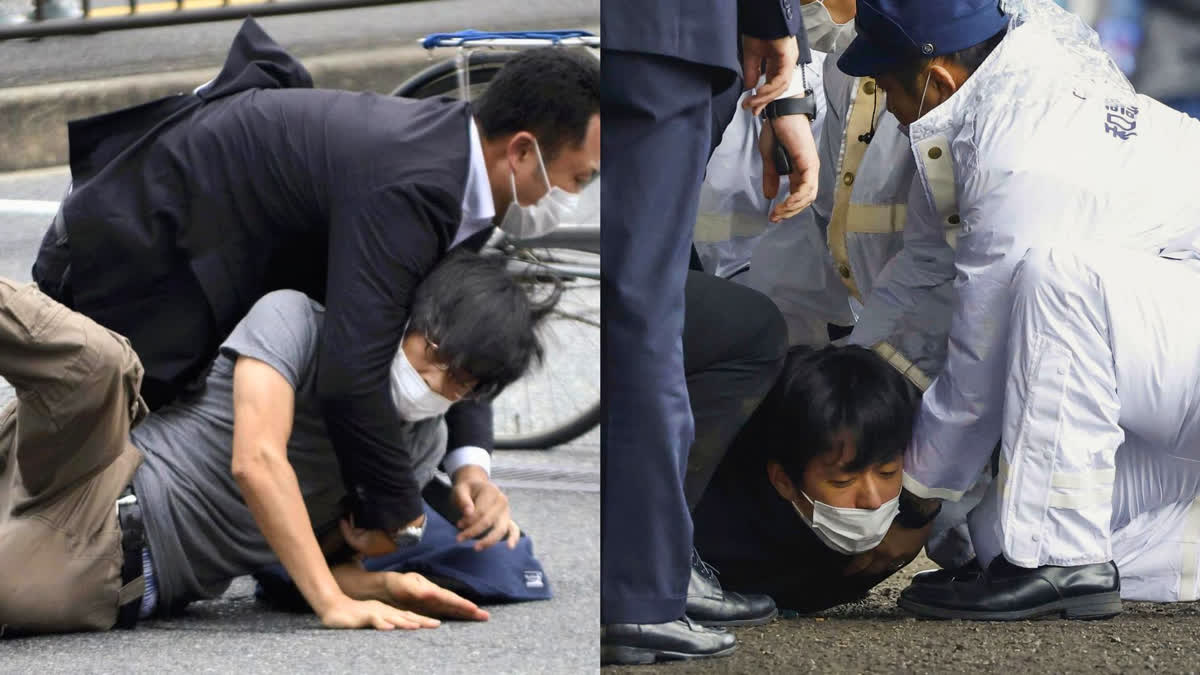Hyderabad: The blast from which Japan Prime Minister Fumio Kishida escaped unhurt has brought back the memories of former Prime Minister Shinzo Abe's assassination. The unidentified attacker has been taken away from the site on Saturday.
The way the suspect was arrested and pinned down had an eerie resemblance to the spot arrest of Abe's alleged assassin. Both the assailants were participants at the rally and were armed - explosive in the Saturday attack and crude gun in Abe's killing. Both the attacks came on campaign trails.
On July 8, 2022, Abe was shot on a street in western Japan by a gunman as he delivered a campaign speech. The assassination stunned a nation with some of the strictest gun control laws anywhere. He was Japan’s longest-serving leader when he resigned in 2020.
A dramatic video aired by a Japanese broadcaster showed Abe standing and giving a speech outside a train station ahead of parliamentary election. As he was raising his fist to make a point, two gunshots were fired. He was seen collapsing while holding his chest. Blood smears on his white shirt were visible as security personnel leaped towards him. The guards also leapt on to the suspected shooter. He was found face down on the pavement and and a double-barreled weapon was seen nearby.
Also read- PM Fumio Kishida unhurt after explosion at Japan port, evacuated from rally
Abe collapsed bleeding and was airlifted to a nearby hospital in Nara. At that time, he was not breathing and his heart had already stopped. The hospital authorities declared him dead after massive blood transfusions did not help revive his vitas. According to the hospital, Abe suffered a major damage to his heart. He also received two neck wounds that damaged an artery.
A former Japan navy personnel — Tetsuya Yamagami, 41, was arrested by the police from the crime scene. He was carrying a crude homemade gun which was about 15 inches (40 centimeters) long. Similar weapons were confiscated along with his personal computer when the police raided his one-room apartment in the vicinity.
Yamagami during the interrogation responded to questions. He admitted to his plot to kill Abe owing to the leader’s connection to Unification Church. It is said Yamagami was well-off until his mother’s huge donations to the Unification Church which forced him into poverty. The suspect felt neglected and was filled with rage.
Also read- Shinzo Abe killing and Japan’s secret cult of skilled assassins
Five months later in December, Japan’s parliament enacted a law to restrict malicious donation solicitations by religious and other groups. The law was aimed at the Unification Church whose fundraising tactics has become a topic of debate. The public outrage it sparked in the after-math of Abe's assassination due to the cozy ties it enjoyed with the ruling party.
Abe stepped down citing his chronic health problem. Abe who was suffering from ulcerative colitis since teenage was managing it with the treatment. Addressing reporters, Abe had said "it was gut-wrenching to leave many of his goals unfinished". Abe spoke of his inability to resolve the issues of the Japanese abducted years ago by North Korea, a territorial dispute with Russia and a revision of Japan's war-renouncing constitution. That last of the unfinished business was on the top of the list which made him a divisive figure.
Abe's ultra-nationalism riled the Koreas and China. His push to normalise Japan's defence posture had angered many Japanese. He also failed to achieve his cherished goal of formally rewriting the US-drafted pacifist constitution because of poor public support.
Also read-Japanese PM orders probe into controversial religious sect



